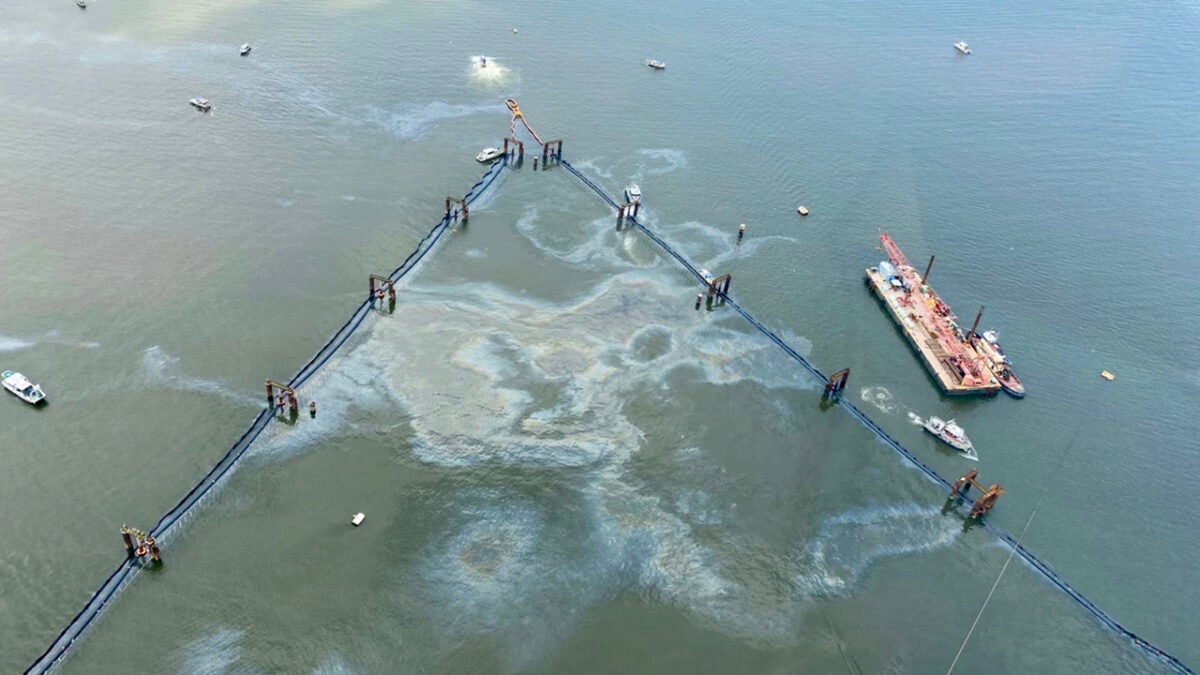Cleanup crews are still working around the clock to stop oil leaking from the Golden Ray, a roll-on/roll-off (ro-ro) vessel that capsized off the coast of Georgia nearly two years ago.
The leak began about a week ago after workers dismantled a section of the Golden Ray. The tide swept oil spilling from the wreckage under an environmental protection barrier that was set up around the half-submerged ship.
Michael Himes, a spokesman for St. Simons Sound Incident Unified Command, said oil was still seen leaking from the wreckage on Friday.
“The No. 1 priority is to contain the [oil] discharges,” Himes told FreightWaves.
St. Simons Sound Incident Unified Command is the multiagency group in charge of the Golden Ray’s removal from St. Simons Sound. The ro-ro vessel capsized Sept. 8, 2019, in the sound after departing from the Port of Brunswick, Georgia.
The Unified Command has dismantled and removed five pieces of the ship, but the sixth piece began leaking oil as crews tried to lift it out of the water.
Crews have not been able to determine the exact source of the leak. The Golden Ray was carrying 4,200 vehicles when it capsized.
“The other part of the lifting procedure is to control the source of the discharge,” Himes said. “With each lift, we’ve been able to get the section a little bit higher before a discharge happens.”

The ship also had a crew of 24, including 23 crewmembers and a pilot. All crew members survived.
Naval officials said the capsizing was caused by unstable ballast levels not compliant with stability regulations, according to modeling conducted by the U.S. Coast Guard.
The oil spill comes two months after the Golden Ray wreckage caught on fire, causing another delay.
Himes said response vessels continue to recover oil from St. Simons Sound, while shoreline teams continue to remove oily sand from nearby beaches.
“Each day we’ve been removing at least between 1,000 to 1,500 bags of oily sand,” Himes said.
The oily water is being collected through several methods, such as oil spill containment booms, oil skimmers and floating oil vacuums.
“Out in the sound, we’ve got the containment boom. The oil pools up, then we use Marco skimmers and a vacuum attachment. All of these strategies do collect a fair amount of water but they’re also collecting oil at the same time,” Himes said.
The cleanup will continue over the weekend on shore and in the sound.
“We’re doing a significant amount of shoreline cleanup and treatment, particularly on the west, southwest side of St. Simons Island, where we’ve had an area of shoreline and marsh grass impacted,” Himes said.
Himes said the Unified Command plans for scenarios such as this.
“This is why we put that infrastructure out there, before we started removing the wreck. When you combine how complex removing a ship is, and having such a dynamic waterway — combine those factors with our response priorities, which is keep people safe, both the community and our first responders, while minimizing impacts to the environment and maintaining a functional ship channel — what we get is a process that basically takes time,” Himes said.
Click for more FreightWaves articles by Noi Mahoney.
More articles by Noi Mahoney
PS Logistics acquires Texas flatbed carrier







